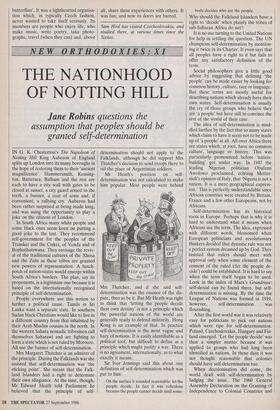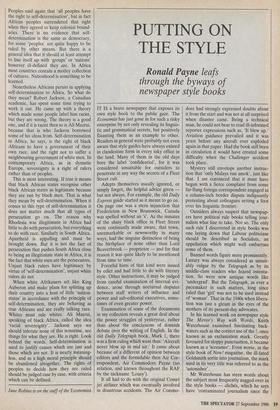NEW ORTHODOXIES: XI
THE NATIONHOOD OF NOTTING HILL
assumption that peoples should be granted self-determination
IN G. K. Chesterton's The Napoleon of Notting Hill King Auberon of England splits up London into its many boroughs in the hope of restoring them to their 'ancient magnificence'. Hammersmith, Kensing- ton, Battersea, Balham and the rest are each to have a city wall with gates to be closed at sunset, a city guard armed to the teeth, a banner, a coat of arms and, if convenient, a rallying cry. Auberon had been rather surprised at being made king, and was using the opportunity to play a joke on the citizens of London.
In South Africa many white people and some black ones seem keen on putting a good joke to the test. They recommend self-government for the peoples of the Transkei and the Ciskei, of Venda and of Bophuthatswana. They envisage the reviv- al of the traditional cultures of the Xhosa and the Zulu as these tribes are granted new powers of representation. A hotch- potch of nation-states would emerge within South Africa's borders. The plan, say its proponents, is a legitimate one because it is based on the internationally recognised principle of self-determination.
People everywhere use this notion to further a political cause. Tamils in Sri Lanka want a separate state. In southern Sudan black Christians would like to live in a different country from that inhabited by their Arab Muslim cousins in the north. In the western Sahara nomadic tribesmen call themselves Saharawi and are fighting to form a state which is not ruled by Morocco. All use the banner of self-determination.
Mrs Margaret Thatcher is an admirer of the principle. During the Falklands war she insisted that self-determination was 'the sticking point'. She meant that the Falk- land Islanders had a right to determine their own allegiance. At the time, though, Mr Edward Heath told Parliament he believed that the principle of self- determination should not apply to the Falklands, although he did support Mrs Thatcher's decision to send troops there to rid the place of Argentinian soldiers.
Mr Heath's position on self- determination was not calculated to make him popular. Most people were behind Mrs Thatcher, and if she said self- determination was the essence of the dis- pute, then so be it. But Mr Heath was right to think that 'letting the people decide their own destiny' is not a principle which the powerful nations of the world are generally ready to defend militarily. Hong Kong is an example of that. In practice self-determination is the most vague and hazy of notions. It is easily identifiable as a political tool, but difficult to define as a principle which might justify a war. There is no agreement, internationally, as to what exactly it means.
Sir Ivor Jennings said this about one definition of self-determination which was put to him:
On the surface it sounded reasonable: let the people decide. In fact it was ridiculous because the people cannot decide until some- body decides who are the people.
Why should the Falkland Islanders have a right to 'decide' when plainly the tribes of sub-Saharan Africa do not?
It is no use turning to the United Nations for help in settling the question. The UN champions self-determination by mention- ing it twice in its Charter. It even says that all peoples have a right to it but fails to offer any satisfactory definition of the term.
Social philosophers give a little good advice by suggesting that defining 'the people' can be made easier by looking for common history, culture, race or language.
But these terms are mostly useful for describing nations which already have their own states. Self-determination is usually the cry of those groups who believe they are 'a people' but have still to convince the rest of the world of their case.
The idea of self-determination is mud- dled further by the fact that so many states which claim to have it seem not to be made up of 'a people' at all. All over Africa there are states which, at root, have no common culture, language or history. This was particularly pronounced before 'nation- building' got under way. In 1947 the leading Nigerian politician Obafemi Awolowo proclaimed, echoing Metter- nich's opinion of Italy, that 'Nigeria is not a nation. It is a mere geographical express- ion.' This is perfectly understandable since African countries were created by Britain, France and a few other Europeans, not by Africans.
Self-determination has its historical roots in Europe. Perhaps that is why it is hard to understand what it means when Africans use the term. The idea, expressed with different words, blossomed when European politicians and revolutionary thinkers decided that dynastic rule was not a perfect system dreamed up by God. They insisted that rulers should meet with approval only when some element of the consent of the ruled (let the people de- cide') could be established. It is hard to say when the term itself began to be used. Look in the index of Marx's Grundrisse: self-denial can be found there, but self- determination is missing. By the time the League of Nations was formed in 1919, however, self-determination was flourishing.
After the first world war it was relatively easy for politicians to pick out nations which were ripe for self-determination.
Poland, Czechoslovakia, Hungary and Fin- land emerged. 'Let the people decide' was then a simpler matter because it was applied to groups who had long been identified as nations. In those days it was not thought reasonable that colonies should have self-determination too.
When decolonisation did come, the world dealt with self-determination by fudging the issue. The 1960 General Assembly Declaration on the Granting of Independence to Colonial Countries and Peoples said again that 'all peoples have the right to self-determination', but in fact African peoples surrendered that right when they agreed to keep colonial bound- aries. There is no evidence that self- determination is the same as democracy, for some 'peoples' are quite happy to be ruled by other means. But there is a general idea that it should at least attempt to line itself up with 'groups' or 'nations' however ill-defined they are. In Africa most countries contain a motley collection of cultures. Nationhood is something to be learned.
Nonetheless Africans persist in applying self-determination to Africa. So what do they mean? Robert Jackson, a Canadian academic, has spent some time trying to work it out. He came up with a theory which made some people label him racist, but they are wrong. The theory is a good one, and if it is racist then so is Ali Mazrui, because that is who Jackson borrowed some of his ideas from. Self-determination in Africa, he says, is the right of black Africans to have a government of their own race, and the right not to suffer a neighbouring government of white men. In contemporary Africa, as in dynastic Europe, sovereignty is a right of rulers rather than of peoples.
This is most interesting. If true it means that black African states recognise other black African states as legitimate because they are run by black men. That is what they mean by self-determination. When it comes to this type of self-determination it does not matter much that all types of persecution go on. The reason why Rhodesia was illegitimate in Africa had little to do with persecution, but everything to do with race. Similarly in South Africa. Apartheid is appalling and must be brought down. But it is not the fact of persecution that pushes South Africa close to being an illegitimate state in Africa, it is the fact that white men are the persecutors. Unjust black rulers have legitimacy by virtue of 'self-determination', unjust white rulers do not.
When white Afrikaners act like King Auberon and make plans for splitting up their country into a host of little 'nation- states' in accordance with the principle of self-determination, they are behaving as true Africans and are really talking race. Whites must rule whites. All Mazrui, speaking of black Africa, called the idea `racial sovereignty'. Jackson says we should tolerate none of this nonsense, see things for what they are. He is right. Look behind the words. Self-determination is used to justify causes which are just and those which are not. It is nearly meaning- less, and as a high moral principle should be abandoned altogether. The rights of peoples to decide how they are ruled should be judged case by case, with criteria which can be defined.
Jane Robins is on the staff of the Economist.



























































 Previous page
Previous page